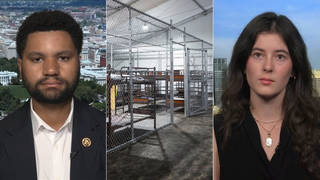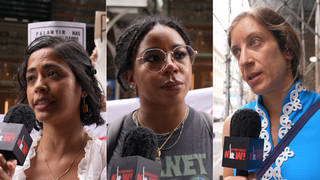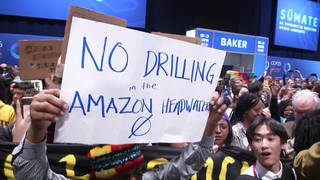
Located in the central Pacific Ocean between Hawaii and the Philippines, the Marshall Islands are one of the world’s lowest-lying island nations and declared a national climate crisis emergency in October. “We’re looking at changing the entire physical landscape of our island so we can stay above water,” says Marshall Islands poet and climate activist Kathy Jetñil-Kijiner. She joins us to describe the impact on her country and read her newest poem.
Transcript
AMY GOODMAN: This is Democracy Now!, democracynow.org, The War and Peace Report. We’re broadcasting from inside the U.N. Climate Change Conference here in Madrid, Spain. We turn now to ground zero of the climate crisis: the Marshall Islands, one of the lowest-lying island nations in the world, located in the central Pacific Ocean between Hawaii and the Philippines. The Marshall Islands declared a national climate crisis emergency in October. Earlier this week, Marshall Islands youth activist Carlon Zackhras addressed global climate negotiators in a youth forum here at the U.N. summit.
CARLON ZACKHRAS: Greetings from the Marshall Islands. Before I came to Madrid, exactly two weeks ago, I experienced 16-foot swells that forced 200 people from their homes. Not only do we have inundations, but we also have the dengue fever epidemic, the flu, and I know just recently our Pacific neighbors in Samoa are fighting the measles, that took 70 lives, 30 of which are children under the age of 4. These are illnesses linked to and made worse by climate change.
We’ve been told that if we want to stay in our islands, we’d have to adapt and elevate, and with migration as the only Plan B. We’re having to deal with these issues that we in the first place did not create. And may I remind you, the Marshall Islands’ contribution to climate change is only 0.00001% of the world’s emissions. This is why our country is pushing for a social media campaign called #MAD4Survival. And we encourage everyone to join in.
My home is only two meters above water. With the threats of climate change, we’d lose two meters of our culture, our yokwe, our manit, our roro, our beet, our language, two meters of our legends. This is why we created a youth leaders coalition, that has the youth create innovative ways to fight climate change and lobby the them towards our leaders. A team of students came up with a new sustainable design for a seawall that our Minister of Environment David Paul has shown interest towards. This is why our youth should be more involved. When you are in trouble, you find new solutions to face it. And our youth has proven to do so. This is why I’m here, to represent them and their ideas, to be a part of the generation that’s going to end of the fight against climate change, to voice out the reality of the future that the Marshall Islands is facing, to tell you that we don’t want to lose our only two meters. Thank you.
AMY GOODMAN: That’s youth activist Carlon Zackhras. For more on the Marshall Islands, we’re joined now by Kathy Jetñil-Kijiner, poet, climate envoy for the Marshall Islands here at the climate summit, also daughter of the president of the Marshall Islands.
We welcome you to Democracy Now! Ground Zero for the climate crisis or catastrophe, and you in the Marshall Islands have declared a climate emergency. Explain.
KATHY JETÑIL-KIJINER: Yeah. So, we declared a climate crisis this past September, before the September climate summit. And this really shows that on a national level we’re recognizing how serious of an issue it is for our country, and we’re trying to signal that to the international community by declaring it.
AMY GOODMAN: Explain how climate change affects the Marshall Islands. And how large is this archipelago of islands?
KATHY JETÑIL-KIJINER: Well, it’s tiny. I mean, we’re a coral atoll nation, so we’re one of the smallest nations on Earth. We’re only two meters above sea level. There’s no mountains. And right now —
AMY GOODMAN: And how many islands?
KATHY JETÑIL-KIJINER: Over 60 coral atolls, yeah, the last that I checked, about, but I don’t have the exact number. There’s quite a few. It’s spread across a lot of ocean. But it’s impacting us in a lot of different ways. First off, just two weeks ago, before I came here, we had 16-foot swells of inundations that displaced over 200 people. We’re having disease and health outbreaks. We had over a thousand cases of dengue outbreaks in the last month.
AMY GOODMAN: How does dengue relate to the climate change?
KATHY JETÑIL-KIJINER: Well, apparently, the mosquito-related illnesses, mosquito-borne illnesses, increase with climate change. And so, these kinds of disease outbreaks are going to increase as climate change worsens. And so these are kind of some of the impacts that we’re seeing. But we’re also developing our National Adaptation Plan. And this is a national — we’re calling it our survival plan. So we’re not just looking at mitigation, you know, lowering our CO2 emissions and, you know, solar panels. We’re looking at actually changing the entire physical landscape of our island so that we can stay above water.
AMY GOODMAN: Kathy, two years ago at the climate summit in Bonn, Germany, that was actually hosted by Fiji —
KATHY JETÑIL-KIJINER: Yeah.
AMY GOODMAN: — we were joined by you and your mother —
KATHY JETÑIL-KIJINER: Yeah.
AMY GOODMAN: — the president of the Marshall Islands, Hilda Heine. I asked her about the legacy of nuclear testing in the South Pacific and the Marshall Islands.
KATHY JETÑIL-KIJINER: Yes, yeah.
PRESIDENT HILDA HEINE: The legacy of the nuclear testing program brings back the whole issue of colonialism and how the U.S. has colonized the Marshall Islands. To this day, we’re still struggling with the legacy of the — you know, what we call jellyfish babies. We have people who —
AMY GOODMAN: This is babies without bones.
PRESIDENT HILDA HEINE: Babies without bones that were born by women who were — who lived in the islands that were contaminated. And we still have people who have not returned to their homelands after 50 years of being displaced from their homelands. We have islands that were vaporized by the nuclear testing program. Of course, these islands belonged to people. And those can never be recovered. So we’re still seeking nuclear justice for the people of the Marshall Islands. This is one of the — the legacy of the U.S. presence in our country. And it seems like we’re repeating with the climate change issue coming on, also same force from outside being brought to influence or to impact the livelihood of Marshallese.
AMY GOODMAN: That’s Marshall Islands President Hilda Heine. We’re joined by her daughter, Kathy Jetñil-Kijiner. They were together on Democracy Now! two years ago in Bonn at the summit. Kathy is part of the climate delegation. She is a poet. She is a climate envoy. Because you are a poet, share a poem with us.
KATHY JETÑIL-KIJINER: Yes. So, this poem is actually my latest poem, and it’s about that National Adaptation Plan I told you about. You know, as indigenous people, we’re really rooted to the land, and so having to go about these negotiations and represent our nation, it can be really disheartening. And so, it’s about that, but it’s also about a cultural tradition called the kemem, which is the first birthday, where we celebrate our first birthday. It’s the biggest one. So it’s about how our cultural traditions really kind of bring us — give us hope and nourish us. And so this is the piece. Oh, and I should say that kemems are significant because children used to die at a high mortality rate, so it’s a poem of survival.
When my daughter whines, I tell her, “Say what you want in a nice voice.” My nice voice is reserved for meetings with a view, my palm outstretched, saying, “Here are our problems” — legacies rolling out like multicolored marbles.
“Don’t focus so much on the doom and the gloom,” they keep saying. “We don’t want to depress everyone.” This is only our survival. “We rely heavily on foreign aid,” I’m instructed to say. I’m instructed to point out the need for funds to build islands, move families from wato to wato, my mouth a shovel to spade the concrete with, but I am just pointing out neediness. So needy, these small, underdeveloped countries. I feel myself shrinking in the back of the taxi when a diplomat compliments me: “How brave for admitting it so openly.” The allure of global negotiations dulls like the back of a worn spoon.
I lose myself easily in a kemem, kemem defined as feast, a celebration. A baby’s breath endures their first year, so we pack hundreds of bodies under tents, lined up for plates I pass to my cousin assembly line-style. Our gloved hands pluck out barbecue chicken, fried fish, scoop potato salad, dewlike droplets of bob and ma. Someone yells for another container of jaajmi. The speaker warbles a keyboarded song. A child cries. Mine dances in the middle. The MC shouts, [in Marshallese] “Your children are obstructing the view!” Someone wheels a grandma onto the dance floor. The dances begin. Now, here is a nice celebration of survival.
AMY GOODMAN: Kathy Jetñil-Kijiner, poet from the Marshall Islands. As we wrap up, the solutions that Marshall Islands is engaged with?
KATHY JETÑIL-KIJINER: Yes. Yeah, so, I wanted to make it clear that, you know, we’re not just victims of this kind of process, sort of what’s happening. Marshall Islands is doing a lot in the forefront. We were one of the first countries to enhance our NDCs. We have a really ambitious 2050 renewable energy plan, and we have solarized most of our outer islands. And we’ve also — we’re leading the Climate Vulnerable Forum. We’re the chair of this alliance of 48 nations of the most vulnerable nations. We’re heading the High Ambition Coalition. And we even started a #MAD4Survival social media campaign while here, the Madrid Ambition Drive for Survival. And we’ve been going around getting as many countries as they can to join on, to say that they’re enhancing their NDCs.
AMY GOODMAN: We’re going to have to leave it there.
KATHY JETÑIL-KIJINER: Yeah.
AMY GOODMAN: But we will continue this discussion. Kathy Jetñil-Kijiner —
KATHY JETÑIL-KIJINER: Thank you.
AMY GOODMAN: — a poet and climate envoy from the Marshall Islands here at the U.N. climate summit.
Congratulations to our news director Mike Burke and his wife Michelle on the birth of their baby boy on International Human Rights Day. Welcome to the world!













Media Options